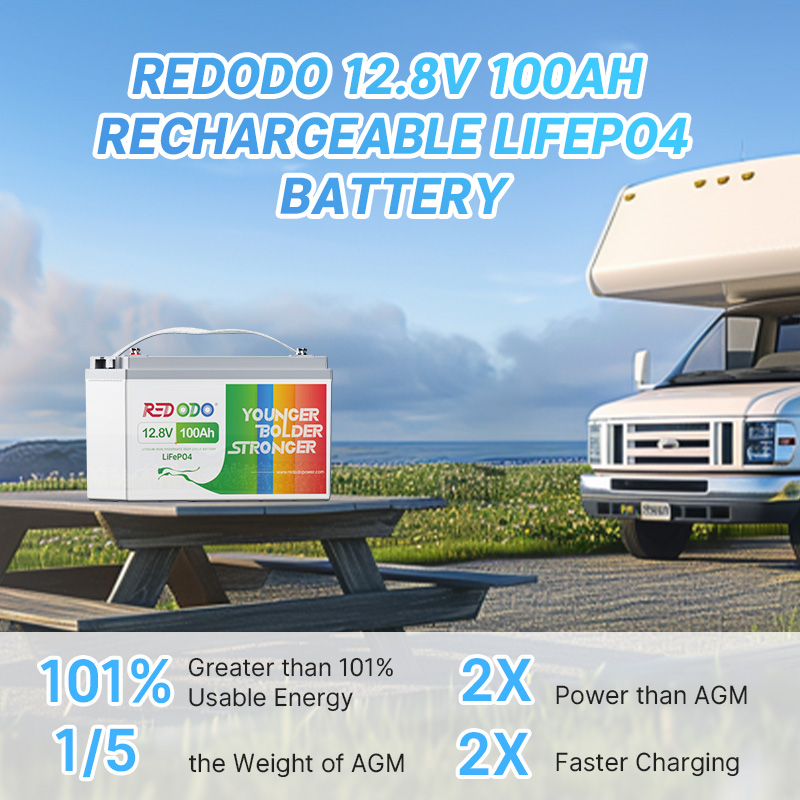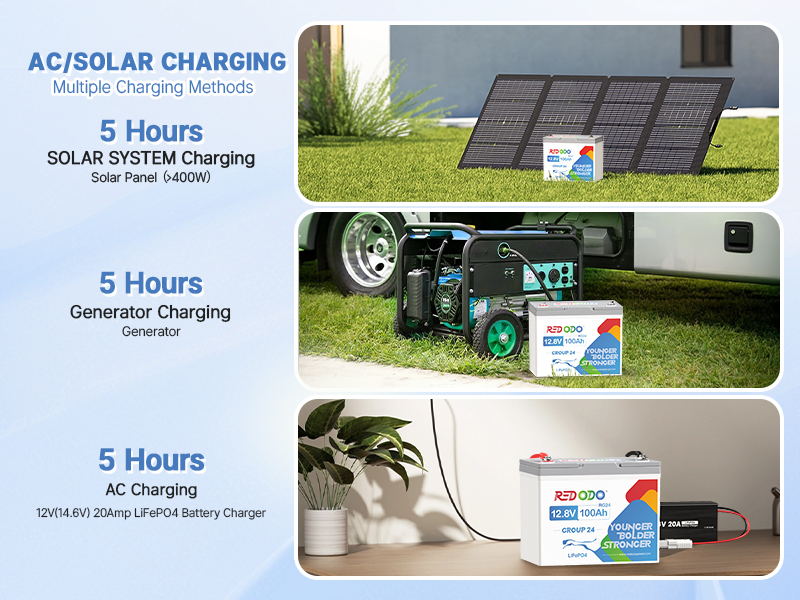RV refrigerators are essential for keeping food and drinks cold, especially during long trips or boondocking in remote areas. When planning an RV adventure, knowing how long your battery will run a 12V RV fridge is crucial for ensuring a smooth experience without power interruptions.
In this article, we’ll explain the factors that affect a 100Ah lithium battery power for a 12V fridge, how to calculate run time, and provide some tips for maximizing battery efficiency.
Table of Content
Key Factors that Affecting Battery Run Time
The run time of a 100 amp hour lithium battery for a 12V refrigerator depends on several key factors:
Fridge Power Consumption
RV refrigerators vary in power consumption, typically between 20-50 watts. The more efficient your fridge is, the longer your battery will last. Energy-efficient models tend to use less power and are a better match for off-grid trips.
Battery Efficiency
A lithium battery offers much greater efficiency compared to lead-acid batteries. While lead-acid batteries can only use 50% of their capacity before needing a recharge, a lithium battery like the Redodo can use nearly 100% of its capacity. This means you can fully utilize the 100Ah, providing longer run times.
Ambient Temperature
The outside temperature impacts how often the fridge's compressor cycles on and off. In summer or hot climates, the fridge will work harder to maintain a cool temperature, consuming more power and reducing the overall run time.
Calculating How Long a 100Ah Lithium Battery Will Run a 12V Fridge
To estimate how long your 100Ah battery for a 12-volt refrigerator will last, you need to understand the fridge’s power consumption and how much usable power your battery provides.
Step 1: Determine the Fridge’s Power Usage
Firstly, we need to know how many watts does a refrigerator use. The power consumption of the refrigerator is usually measured in watts (W) or watt-hours (Wh), and you can find this information on the specification label located on the exterior of the fridge.
If your refrigerator's power is listed in watts, multiply it by the number of hours it runs per day to get the Wh. For example, your refrigerator runs at 40W typically, the watt-hour is 960Wh (40W × 24 hours) per day.
It’s important to estimate the duty cycle, which is the proportion of time the compressor is active. Typically, this duty cycle can vary between 20% and 50%, influenced by factors like ambient temperature, insulation quality, and the temperature of the items inside. Therefore, using the 40W fridge example:
Actual power usage would be: 960Wh x 40% = 384Wh. This means that the fridge consumes about 480Wh per day on average.
Step 2: Convert Watt Hours to Amp Hours
Since the 100Ah lithium battery is rated in amp-hours (Ah), we need to convert the fridge’s power consumption from Wh to Ah. This is done by dividing the power consumption in Wh by the voltage of the system. In this case, let's say you're using a 100Ah LiFePO4 battery, and the battery voltage is 12.8V:
384Wh / 12.8V = 30Ah
This means your fridge will draw 30 amp-hours per day from the battery.
Step 3: Calculate the Battery Run Time
With a 100Ah lithium battery, you can use almost all of the available capacity. So, to estimate how long the battery will run the fridge:
Run Time = Battery Capacity / Fridge Amp-hours = 100Ah / 30Ah/day = 3.3 days.
Therefore, a 100Ah LiFePO4 lithium battery can run a 12V Fridge for about 3.3 days.
Also, you can use a simpler way to estimate the run time of a 100Ah lithium battery for a 12V fridge:
A 100Ah LiFePO4 battery can offer 1280W (100Ah × 12.8V) power. If your refrigerator's label specifies its annual or daily energy consumption, directly divide the total battery power by the fridge's daily energy usage.
For example, if the annual energy consumption of your fridge is 200kW, the daily consumption would be approximately 548W (200kW / 365 days). So, the runtime can be calculated as:
Runtime = Battery Power / Fridge Daily Power Consumption = 1280W / 548W = 2.3 days.
However, it’s important to note that this calculation assumes ideal conditions when using a 100Ah lithium battery to run a 12V fridge. In real situations, you may need to consider factors like inverter efficiency (if applicable), line loss, and the usable capacity of your battery.
If you need longer run times and greater capacity, take a look at Redodo 12V lithium batteries. They offer up to 101% usable capacity, which is double that of traditional lead-acid batteries.

Check out our Redodo 12V 100Ah Mini LiFePO4 battery testing and see how well it powers a freezer in outdoor conditions.
Tips for Reducing Fridge Consumption & Maximize Battery Life
Reducing the electricity consumption of your RV refrigerator can significantly extend the life of your battery for a 12-volt RV refrigerator. Here are some effective strategies to minimize energy usage:
Keep the Fridge Full
A fuller fridge helps maintain a consistent temperature, as there’s less air that needs to be cooled. If you don’t have enough food to fill it, consider using water bottles or ice packs to take up space.
Pre-Cool Items Before Placing Them Inside
Before adding groceries to your fridge, pre-cool them in a regular refrigerator or cooler. Cold items won’t require as much energy to chill, helping your fridge operate more efficiently.
Set the Right Temperature
Adjust the temperature setting of your fridge to the optimal level. Aim for a temperature that keeps food fresh without overcooling.
Additionally, to get the most out of your 100Ah lithium battery for a 12V refrigerator, consider the following tips:
Use Solar Panels or AC for Charging Battery
Adding a solar panel setup can help keep your battery charged throughout the day, especially when camping in sunny locations. This way, your battery will stay topped up, extending the run time of your fridge. Additionally, when you’re at a campground with hookups or have access to regular AC power, you can use your RV's converter charger to recharge your battery.

Park in Shaded Areas
Parking your RV in the shade can help keep the fridge from working as hard to stay cool, which reduces energy consumption.
Conclusion
In summary, running a 12V fridge or refrigerator on a 100Ah lithium battery can last quite a while depending on the fridge’s power consumption, duty cycle, and other factors like inverter efficiency. By understanding your fridge’s energy needs and implementing energy-saving strategies, you can optimize battery usage. Additionally, for extended trips or higher energy demands, preparing more batteries or upgrading to more efficient batteries like the Redodo 12V lithium batteries can provide longer run times and increased reliability.
FAQs on 100Ah Lithium Battery Runtimes
How many volts and amps does a refrigerator use?
Most RV refrigerators run on either 12V DC or 120V AC, depending on the power source available. For a typical 12V refrigerator, the current it uses in amps can vary based on its power rating. For example, if a 12V refrigerator consumes 50 watts, it will typically use around 4.2 amps. On a 120V AC system, the amp usage would be lower, but the overall power consumption remains similar.
How long can a 100Ah lithium battery run an RV air conditioner?
Running an RV air conditioner on a 100Ah lithium battery depends on the power consumption of the AC unit and how long you need it to run. Most RV air conditioners use between 1,000 to 2,000 watts. For a 12V system, a 1000W AC would draw around 83.3 amps per hour. Given a 100Ah lithium battery, it could power the AC for about 1.2 hour before being fully drained. Since lithium batteries should not be discharged completely, you might only get one hour of runtime, depending on the efficiency and cycling of the AC. For longer-time use, you would need a much larger battery bank or an additional power source like solar or a generator.

Redodo

Redodo
Recent Post

How Long Does a Trolling Motor Battery Last?

Convert RV from Lead-Acid to Lithium Battery: A Complete Guide

How Long Will a 200Ah Battery Run an Air Conditioner?

A Full Review of Redodo 12V 140Ah Group 31 Deep Cycle Battery

![⚡[$220 after Sign-Up] Redodo 12V 100Ah LiFePO4 Lithium Battery | Best Budget | For RV, Solar, Trolling Motor](http://www.redodopower.com/cdn/shop/files/Redodo_12v_100ah_lithium_battery_b9015ddd-64b5-4be2-8c88-392f0bb4ab30.jpg?v=1742973160)
![⚡[$220 after Sign-Up] Redodo 12V 100Ah Lithium Trolling Motor Battery With Low Temp Protection](http://www.redodopower.com/cdn/shop/files/Redodo12V100Ahlow-tempbattery.webp?v=1738462317)

![⚡[$239 after Sign-Up] Redodo 12V 100Ah Group 24 Bluetooth LiFePO4 Battery | Real-Time Battery Monitoring | For RV, Marine, Solar](http://www.redodopower.com/cdn/shop/files/Redodo_12V_100Ah_group_24_bluetooth_lithium_battery.jpg?v=1744253032)
![⚡[$220 after Sign-Up] Redodo 12V 100Ah Group 31 Bluetooth Lithium Battery | Real-Time Battery Monitoring | For RV, Marine, Solar](http://www.redodopower.com/cdn/shop/files/Redodo_12V_100ah_group31_bluetooth_lithium_battery.jpg?v=1745565708)
![⚡[$450 after Sign-Up] Redodo 12V 280Ah LiFePO4 Battery | Low Temp Protection | For RV, Marine, Solar](http://www.redodopower.com/cdn/shop/files/Redodo12V280AhLowTempCutoffLiFePO4Battery.jpg?v=1741251504)
![⚡[$524 after Sign-Up] Redodo 12V 300Ah Lithium LiFePO4 Battery | Replaces 6*12V 100Ah AGM Batteries | RV, Marine, Solar](http://www.redodopower.com/cdn/shop/files/Redodo_12V_300ah_lithium_deep_cycle_battery.png?v=1744797523)
![⚡[$220 after Sign-Up] Redodo 12V 100Ah Mini Lithium LiFePO4 Battery | Smallest Battery | For RV, Trolling Motor, Solar](http://www.redodopower.com/cdn/shop/files/Redodo12V100AhMiniLiFePO4LithiumBattery.jpg?v=1739959054)
![⚡[$294 after Sign-Up] Redodo 12V 140Ah Group 31 Lithium Battery with Bluetooth | 40% More Capacity | For RV, Marine, Solar Home](http://www.redodopower.com/cdn/shop/files/Redodo_12V_140ah_bluetooth_battery_ee6d5fd1-5c7d-4b9a-90ab-d54d06b29a04.jpg?v=1742967763)